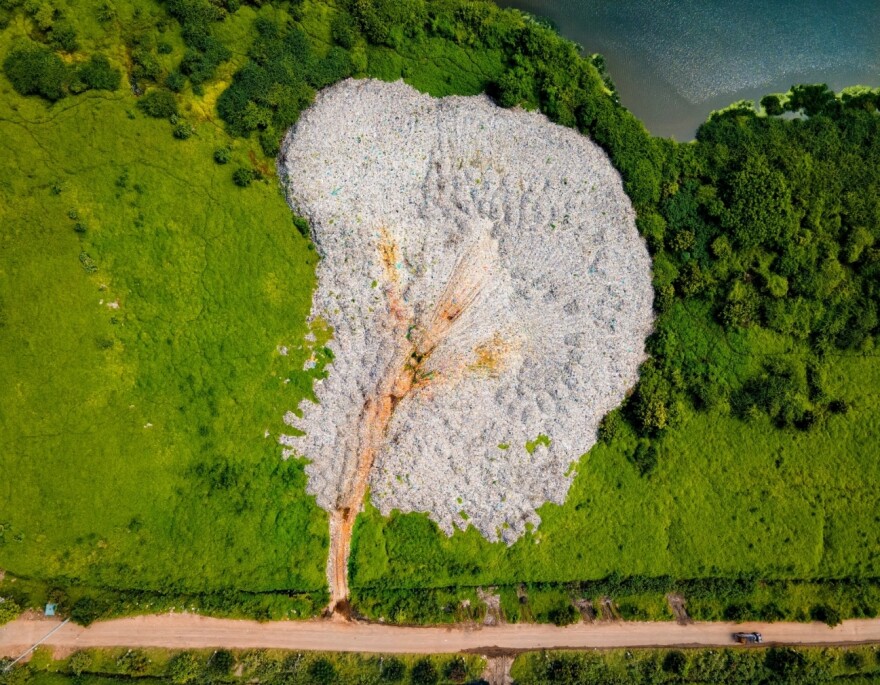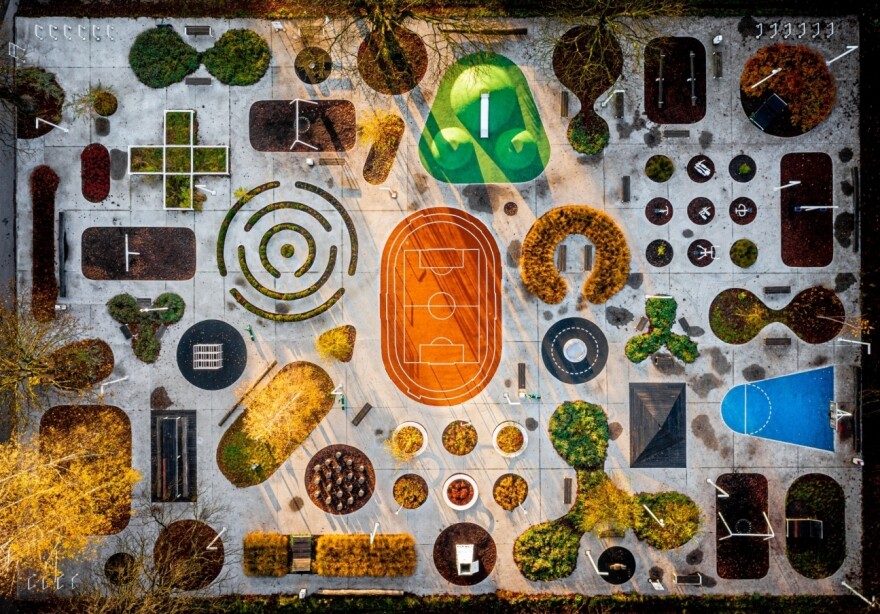Sometimes a (camera's) eye in the sky can cast new light on the world we live in – highlighting changes or celebrating beauty we might be oblivious to on ground level.
And that's what you'll see in the winners from this year's Drone Photo Award winners. From a bird's eye view, a bright yellow rice field in Bangladesh turns into a symmetrical pattern, a precisely-designed Polish playground looks like a mosaic of precious stones and a holy religious tradition amid the crumbles of a war-ravaged city in Syria conjures up both sorrow and holiness.
The photography competition, now in its sixth year, received nearly 14,000 images from amateur and professional photographers from 104 countries for the nine categories of the competition. All photos were taken from above using a drone.
Drone photography offers "the possibility to see things differently," says Emanuela Ascoli, head of photography for National Geographic-France and one of this year's judges. It allows you "to have a global perception of a landscape or scene."
Ascoli says the caliber of submissions was more impressive than ever this year, making it tough for the judges. To earn an award, the photo must "transmit some emotion," says Ascoli. "It must teach you something that you might not have known before." And all of this "should be done in a beautiful, elegant way."
Here's a look at some of those award-winning photos and honorable mentions from around the world, including the countries of the Global South that Goats and Soda covers.
The art of rice processing
"Rice Processing" shows the artistic beauty of a mundane task in Rohan's home country of Bangladesh. "From the ground, it's not that easy to see how beautiful the [rice] field is," says photographer Md Tanveer Hassan Rohan, who's based in New York City. But from an aerial view "you can see the lines and patterns as the [field workers] walk step by step to create this separation." The symmetry of the lines contrasted against the bright yellow fields turns the workers into artists.
Breaking the fast amid the rubble

Mouneb Taim, a freelance photographer based in Turkey, calls his piece "Ramadan meals among the ruins in Idlib, Syria" and says it shows a "mixture of hope, pain and determination."
Born in 2001, Taim has been a photojournalist since he was 12 years old, when he began documenting his life under siege in Idlib, Syria. This photo shows that "neither war nor destruction prevented the people from holding a collective iftar, or breaking of the fast, for the people," says Taim, "which is an important custom in the month of Ramadan."
Taim, who won many international awards during the ten years he lived under siege in Idlib, says that while he has "thousands of drone photos in his archives that show killings, destruction and war" this photo "shows the hope I want to convey to the world."
Chaos at the border

"Dominican Republic Haiti Daily Life" depicts the everyday "chaos on the northern border between the two countries," says freelance photographer Matias Delacroix. They share the island of Hispaniola.
The Associated Press and the Pulitzer Center sent Delacroix, who is now based in Venezuela, to the border for a special assignment. The border is crowded with people on a daily basis, says Delacroix. "[Haitians] try to pass legally to the Dominican Republic, some to trade, others to flee the current violence in Haiti." Drone photography allowed him to "show this chaos in a subtle way, without harming any migrant" and to convey "the amount of people that want to pass from one place to another that from the ground can not be seen in its totality."
For Delacroix, this photo highlights the common human experience of migration, which is part of his own story — he was born in Buenos Aires, Argentina, but then his family moved to Chile. "Many of us in one way or another have had to migrate from where we were born, that is why I identified a lot with this story and with this photo."
A cherished wetland drowning in trash

Raj Mohan's photo "Boon to Bane! – the 300 acres of dumpyard" focuses on his own backyard. A computer scientist and engineer based in Chennai, India, Mohan grew up exploring the local Pallikaranai wetlands to observe the flamingos that flew there during migratory seasons. Seeking to understand recent decreases in migratory birds, Mohan was "baffled to see from a drone view the amount of wetland that was being exploited."
As a photographer, Mohan says he tries to "offer a captivating glimpse into the beauty and diversity of India, weaving together rich narratives and unforgettable moments." But this photo has a different aim – showing how the wetlands — their beauty and their integral role in the ecosystem — are being polluted with trash. While the wetlands are only a few miles from where he lives, Mohan faced challenges with this photo: "It was hard to look at and the foul smell was unbearable."
Strawberry fields forever, Act I, Scene 1

Whales meet boat

Polished Polish playground
Copyright 2023 NPR. To see more, visit https://www.npr.org.






